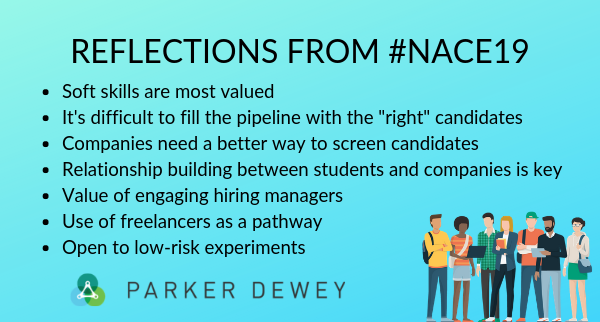
College and University Quality Linked to Work Relevance: Our thoughts on the Gallup / Strada report
If you have not yet seen the Gallup / Strada report released earlier this week we would strongly recommend reading it. The TL; DR is that college students and grads judge the quality of their school based upon the relevance to their work and daily lives. While true (one cannot argue facts), we should all be concerned that many will read the headline and jump to conclusions about post-secondary education.
- The wrong response: vocationalize college education either directly or through boot-camps, badges, and other alternatives.
- The right response: ensure college students better understand the crosswalks from classroom to career, especially for course with names that don't sound like job titles.
The real value of college is development of skills that serve students throughout their entire career, not just their first job. The core problem is not the education provided by colleges, but rather that many students graduate without having the context to understand what is the right job. Furthermore, insights provided through social media coupled with one-click job apps cause new hires to question if they took the right job, and the cost of applying for another is minimal. The result: the job hopping epidemic (but not the good kind that we discuss elsewhere).
So what is the right response? While academic faculty can look to find more opportunities to demonstrate crosswalks in the classroom, much of the opportunity is for career services teams. Specifically, career services need to help students understand and more effectively communicate those skills developed in the classroom to potential employers through their resume and interviews.
And it's worth remembering that at the same time companies are inundated with resumes, and often competing for the same candidates from the same schools, majors, GPAs... and are trying to use tools like assessment, algorithms, AI to predict the right hire. The result: per SHRM Mercer The Joyce Foundation, less than 20% of employers are confident in their hiring decisions and Millennial attrition is up over 50%, costing companies over $30 billion annually. Clearly these tools aren't working.
As employers, we need to be willing to look beyond the major and GPA, especially since neither captures the presence of the Core Skills that we most value per NACE research. The impact of these efforts will include improved hiring effectiveness, diversity, retention, performance, and other key measures of success. This is a very real issue, especially when coupled with other challenges facing higher ed (student debt, the so called skills gap, etc.). If the response is wrong, it be disastrous for colleges, students, companies, and communities.
Why are we making it so difficult? The only way to know if you made a good hire is to see the work. Fortunately we can now use acceptance of gig models to provide students opportunities to have more professional experiences throughout college. Through these Micro-Internships companies gain a better alternative to freelancers, while both companies and students see these crosswalks and can mutually assess fit before committing to a full-time role or internship.
The result: By companies allowing college students to do some work prior to the mutually high-stakes commitment of an internship or full-time role, outcomes (measured by diversity, retention, performance...) will improve.




